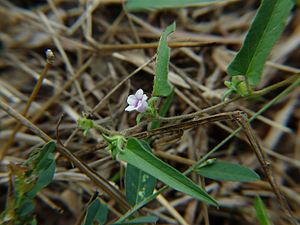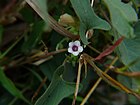Note: This is a project under development. The articles on this wiki are just being initiated and broadly incomplete. You can Help creating new pages.
Difference between revisions of "Ipomoea eriocarpa"
| Line 11: | Line 11: | ||
==Common names== | ==Common names== | ||
| − | {{Common names|sa=|en=|gu=|hi=|kn=|ks=|ml=|mr=|pa=|ta=|te=}} | + | {{Common names|sa=Nakhari|en=Tiny morning glory|gu=Odi kudaradi|hi=Buta|kn=ಮುಳ್ಳು ಬಳ್ಳಿ Mullu balli|ks=|ml=|mr=Maal ghanti|pa=Bhanwar|ta=|te=Purititige}}<ref name="Common names"/> |
==Properties== | ==Properties== | ||
| Line 71: | Line 71: | ||
<ref name="Leaf">[Morphology]</ref> | <ref name="Leaf">[Morphology]</ref> | ||
| + | |||
| + | <ref name="Common names">[https://sites.google.com/site/indiannamesofplants/via-species/i/ipomoea-eriocarpa Common names]</ref> | ||
<ref name="How to plant/cultivate">[http://tropical.theferns.info/viewtropical.php?id=Ipomoea+eriocarpa Cultivation]</ref> | <ref name="How to plant/cultivate">[http://tropical.theferns.info/viewtropical.php?id=Ipomoea+eriocarpa Cultivation]</ref> | ||
Latest revision as of 16:25, 17 June 2020
Ipomoea eriocarpa is a slender, annual, climbing plant with stems 1 - 2 metres long, scrambling over the ground or twining around other plants for support. The plant is commonly eaten as a vegetable in some areas of the tropics such as India and west Africa. Often harvested from the wild, it is also sometimes cultivated.
Contents
- 1 Uses
- 2 Parts Used
- 3 Chemical Composition
- 4 Common names
- 5 Properties
- 6 Habit
- 7 Identification
- 8 List of Ayurvedic medicine in which the herb is used
- 9 Where to get the saplings
- 10 Mode of Propagation
- 11 How to plant/cultivate
- 12 Commonly seen growing in areas
- 13 Photo Gallery
- 14 References
- 15 External Links
Uses
Headache, Rheumatism, Leprosy, Epilepsy, Ulcers, Fevers, Menstrual pain.[1]
Parts Used
Chemical Composition
Common names
| Language | Common name |
|---|---|
| Kannada | ಮುಳ್ಳು ಬಳ್ಳಿ Mullu balli |
| Hindi | Buta |
| Malayalam | |
| Tamil | |
| Telugu | Purititige |
| Marathi | Maal ghanti |
| Gujarathi | Odi kudaradi |
| Punjabi | Bhanwar |
| Kashmiri | |
| Sanskrit | Nakhari |
| English | Tiny morning glory |
Properties
Reference: Dravya - Substance, Rasa - Taste, Guna - Qualities, Veerya - Potency, Vipaka - Post-digesion effect, Karma - Pharmacological activity, Prabhava - Therepeutics.
Dravya
Rasa
Guna
Veerya
Vipaka
Karma
Prabhava
Habit
Identification
Leaf
| Kind | Shape | Feature |
|---|---|---|
Flower
| Type | Size | Color and composition | Stamen | More information |
|---|---|---|---|---|
| {{{5}}} |
Fruit
| Type | Size | Mass | Appearance | Seeds | More information |
|---|---|---|---|---|---|
Other features
List of Ayurvedic medicine in which the herb is used
Where to get the saplings
Mode of Propagation
How to plant/cultivate
In Uganda the plant grows wild in areas with a mean annual rainfall of 1,000 - 1,500mm.[5]
Commonly seen growing in areas
Grassland, Savannah woodland, Cultivated ground, Waste spaces, On clay soils.
Photo Gallery
References
- ↑ Indian Medicinal Plants by C.P.Khare
- ↑ [Chemistry]
- ↑ Common names
- ↑ [Morphology]
- ↑ Cultivation
External Links
- Ayurvedic Herbs known to be helpful to treat Headache
- Ayurvedic Herbs known to be helpful to treat Rheumatism
- Ayurvedic Herbs known to be helpful to treat Leprosy
- Ayurvedic Herbs known to be helpful to treat Epilepsy
- Ayurvedic Herbs known to be helpful to treat Ulcers
- Ayurvedic Herbs known to be helpful to treat Fevers
- Ayurvedic Herbs known to be helpful to treat Menstrual pain
- Herbs with Leaves used in medicine
- Herbs with Seeds used in medicine
- Herbs with common name in Kannada
- Herbs with common name in Hindi
- Herbs with common name in Telugu
- Herbs with common name in Marathi
- Herbs with common name in Gujarathi
- Herbs with common name in Punjabi
- Herbs with common name in Sanskrit
- Herbs with common name in English
- Habit - Annual Climber
- Index of Plants which can be propagated by Seeds
- Herbs that are commonly seen in the region of Grassland
- Herbs that are commonly seen in the region of Savannah woodland
- Herbs that are commonly seen in the region of Cultivated ground
- Herbs that are commonly seen in the region of Waste spaces
- Herbs that are commonly seen in the region of On clay soils
- Herbs
- Pages without herbs images





